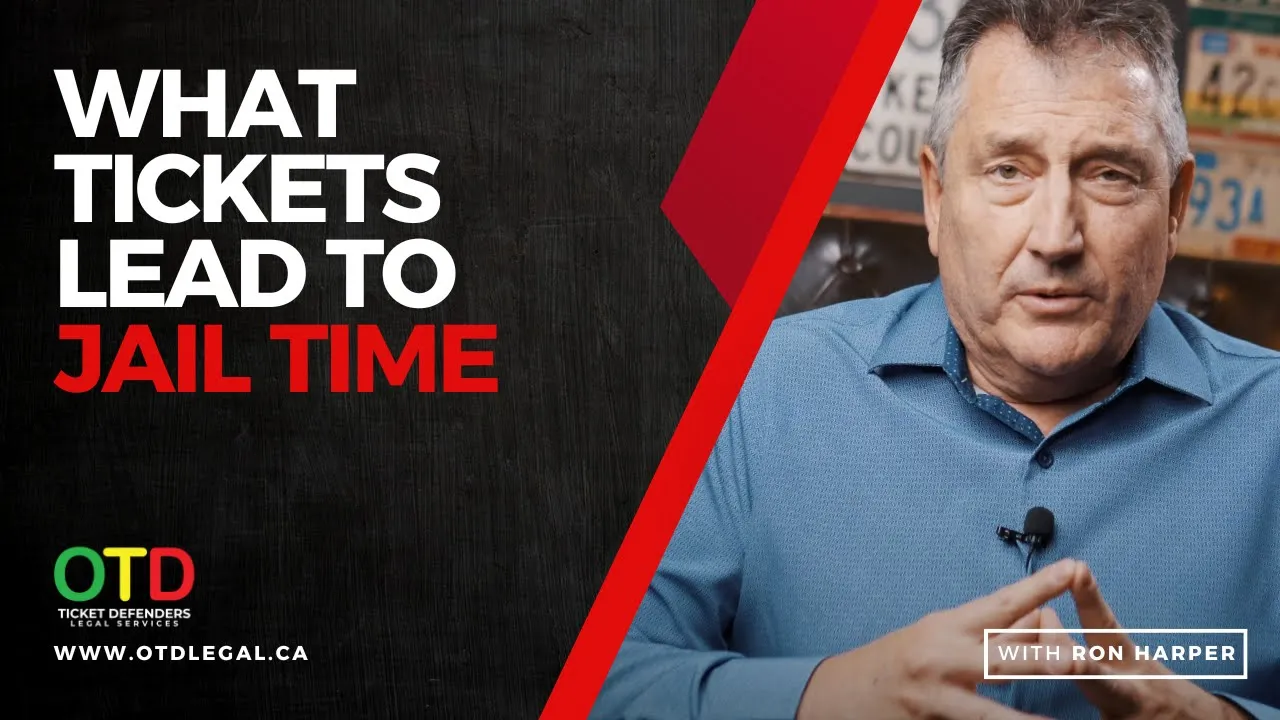It’s a scene most drivers dread: flashing lights in your rearview mirror, the sinking feeling in your stomach, and the inevitable interaction with a police officer that ends with a speeding ticket in your hand. Beyond the immediate fine and potential demerit points, many Ontario drivers find themselves wondering: “Do I have to tell my insurance company about this speeding ticket?”
This is a common question we encounter at OTD Legal, and the answer involves understanding how insurance companies operate, what they already know about your driving record, and how proactive disclosure might affect your premiums.
Why you should avoid calling your car insurance company if you get a speeding ticket
When you receive a speeding ticket, your first instinct might be to contact your insurance company to understand how it will affect your rates. However, this approach could potentially work against your best interests.
Your insurance company doesn’t automatically know about your ticket
Most drivers assume that insurance companies are immediately notified when you receive a traffic ticket. This is not the case. In Ontario, insurance companies typically only discover speeding tickets and other traffic convictions under specific circumstances:
- During policy renewal: Insurance companies commonly check your driving record when your policy comes up for renewal. This is when they’ll discover any convictions that have been registered.
- When you voluntarily disclose it: If you call your insurance company and tell them about your speeding ticket, you’re providing information they might not have discovered yet.
- When they conduct random checks: Some insurance companies periodically check the driving records of their policyholders outside of the regular renewal cycle, though this is less common.
The conviction date matters, not the offence date
An important distinction to understand is that insurance companies are concerned with the conviction date, not the date you received the ticket. A conviction occurs when:
- You pay the ticket (which is an admission of guilt)
- You are found guilty in court
- You fail to respond to the ticket within the specified timeframe (typically 15 days), resulting in an automatic conviction
Until one of these events occurs, the ticket is not considered a “conviction” and will not appear on your driving record or affect your insurance rates.
Fighting your ticket can prevent insurance increases
If you decide to dispute your speeding ticket, it will not appear on your driving record unless you are eventually convicted. This means:
- Your insurance company won’t see the ticket during the dispute process
- If your court date is scheduled after your insurance renewal date, your rates won’t be affected during that policy term
- If you successfully fight the ticket or have it reduced to a lesser offence, you may avoid insurance impacts entirely
By working with a legal professional experienced in traffic tickets, such as our team at OTD Legal, you can improve your chances of keeping the ticket off your record and protect your insurance rates.
When Will the Insurance See My Speeding Ticket?
Understanding when and how your insurance company discovers your speeding ticket is crucial to managing its impact on your premiums.
The Ministry of Transportation record system
In Ontario, the Ministry of Transportation (MTO) maintains a database of all drivers’ convictions, known as a driving record. Insurance companies access this database to review your driving history when determining your premiums. Notably, information only appears on this record after a conviction is registered. This creates a window of opportunity between receiving a ticket and when it potentially affects your insurance.
Policy renewal is the typical discovery point
Most insurance companies in Ontario only check your driving record once per year, typically during your policy renewal. If you receive a speeding ticket and are convicted after your most recent renewal, the conviction won’t affect your insurance until your next renewal date.
For example: If your policy renews in March and you receive a speeding ticket in April, and pay it in May, the conviction would appear on your driving record in May. Your insurance company likely won’t discover this conviction until your next renewal in March of the following year. This timing can be strategically important when deciding whether to fight a ticket or accept the conviction.
Insurance companies don’t share information with each other
Another critical point to understand is that insurance companies don’t automatically share information about your driving record with each other. If you switch insurance providers before your current provider discovers a conviction, your new insurer will conduct their own check of your driving record.
However, it’s important to remember that deliberately misleading or providing false information to an insurance company constitutes fraud and can result in serious consequences, including policy cancellation and potential legal issues.
How Long Do Speeding Tickets Stay on Your Insurance Record?
The duration that a speeding ticket affects your insurance is a key consideration for many drivers.
The three-year rule for traffic convictions
In Ontario, most insurance companies only look at the past 3 years when looking at your driving record. This means they will typically only see convictions that have occurred in the past 3 years. Insurance companies may not even check your driving record every year, depending on your demographic. For example, if you are a driver over 35 years of age with no history of driving violations, it is unlikely that your insurance company will pay to get a copy of your 3 year driver’s abstract every year. It is more likely that they will skip a year or two if they deem you “low risk” for receiving a traffic violation.
This three-year window is significant because:
- It determines how long you’ll potentially pay higher premiums
- It influences how insurance companies classify you as a driver (low-risk, medium-risk, or high-risk)
- Multiple convictions within this window can compound and significantly increase your rates
The difference between driving record and driver’s abstract
It’s important to distinguish between two different records:
- Your driving record (maintained by the MTO): Convictions stay on this record for the entire duration that you hold a driver’s licence, and demerit points remain on your record for two years from the conviction date.
- Your insurance history record: Insurance companies often maintain their own internal records of your insurance history, which may include claims and previous premium adjustments. Some companies may consider your driving history for longer than three years, even though the convictions themselves have fallen off your official MTO record.
When the clock starts ticking
The three-year driver’s abstract period begins on the date of conviction, not the date of the offence. This means:
- If you fight your ticket and delay the court process, you’re also potentially delaying when the three-year clock starts
- If your case takes several months to resolve, the conviction will only appear on your driver’s abstract after the resolution date, not three years after you received the ticket
- This timing can be strategically important when deciding whether to fight a ticket, especially if you already have other recent convictions on your record.
Insurance Rate Adjustments
The financial impact of a speeding ticket on your insurance premiums can vary widely based on several factors.
Factors Influencing Premium Increases
Insurance companies use complex algorithms to determine how much your rates will increase following a conviction. Some of the key factors include:
Severity of the Speeding Violation
Not all speeding tickets are created equal. The amount by which you exceeded the speed limit plays a significant role in determining how insurers view your risk level:
- Minor speeding (1-15 km/h over): Typically result in minimal or no insurance increases for first-time offenders. However, they can still affect any conviction-free discounts you might have.
- Moderate speeding (16-29 km/h over): Often results in moderate premium increases, typically ranging from 10% to 15%.
- Significant speeding (30-49 km/h over): These more serious violations can increase your premiums by 20% to 25%.
- Excessive speeding (50+ km/h over): Classified as “stunt driving” in Ontario, these violations can increase your insurance by 100% or more, or even result in your insurer dropping your coverage entirely.
Your Prior Driving History
Your existing driving record has a substantial impact on how a new conviction affects your rates:
- Clean record: If this is your first conviction in many years, some insurance companies may be more lenient, sometimes offering “first ticket forgiveness” programs.
- Multiple recent convictions: If you already have one or more convictions on your record, an additional speeding ticket will have a more severe impact on your rates.
- Claims history: If you’ve made insurance claims in recent years in addition to having tickets, you may experience more significant rate increases.
Duration Of Impact on Premiums
Understanding how long a speeding ticket will continue to affect your insurance rates is crucial for financial planning:
- First year impact: The largest premium increase typically occurs during the first renewal after the conviction appears on your record.
- Declining impact: Some insurance companies gradually reduce the premium increase in subsequent years if you maintain a clean driving record.
- Multiple ticket scenarios: If you receive multiple tickets within the three-year window, each subsequent conviction will have a compounding effect on your rates.
Typical Insurance Increases for Speeding Tickets
While every insurance company has its own formula for calculating increases, Ontario drivers can generally expect the following premium impacts:
- One minor speeding ticket: 0-10% increase
- Two minor speeding tickets within three years: 25% increase
- Three minor speeding tickets within three years: Up to a 100% increase
- These increases can translate to hundreds or even thousands of dollars in additional premiums over the three-year period the conviction remains on your record.
- Some insurance companies may cancel your policy for a third conviction.
Strategies to Minimize Insurance Impacts
If you’ve received a speeding ticket, there are several approaches to consider:
- Fight the ticket: Working with an experienced traffic ticket defence service like OTD Legal can help keep convictions off your record entirely.
- Shop around for insurance: Different insurance companies weigh tickets differently, so obtaining quotes from multiple providers may help you find more competitive rates.
- Consider higher deductibles: Increasing your insurance deductibles can help offset premium increases, though this means you’ll pay more out-of-pocket if you need to make a claim.
- Maintain a clean record going forward: After receiving a ticket, it’s particularly important to avoid additional violations, as multiple tickets have a compounding effect.
- Ask about conviction-forgiveness programs: Some insurance companies offer programs that forgive a first minor conviction, though these often require purchasing this coverage before receiving a ticket.
Frequently Asked Questions About Speeding Tickets and Insurance
Do I have to tell my insurance company about a speeding ticket?
No, you’re not legally obligated to proactively disclose a speeding ticket to your insurance company. Insurance companies typically discover convictions when they check your driving record during policy renewal. However, if your insurance application specifically asks about recent tickets or convictions, you must answer truthfully to avoid potential insurance fraud issues.
Will my insurance find out about a speeding ticket if I pay it?
Yes. When you pay a speeding ticket, you’re pleading guilty to the offence, and the conviction is registered on your driving record. Your insurance company will discover this conviction the next time they check your driving record, typically at renewal.
How much will my insurance increase for a speeding ticket in Ontario?
The increase varies depending on factors like the severity of the speeding violation, your driving history, and your insurance company’s policies. Generally, a first minor speeding ticket might increase your rates by 0-10%, while multiple tickets can result in increases of 25% to 100% or more.
Can I avoid telling my new insurance company about a previous speeding ticket?
Insurance companies independently verify your driving record when you apply for coverage. You don’t need to proactively mention past tickets, but you must answer honestly if directly asked. Providing false information constitutes insurance fraud and can result in policy cancellation or denial of claims.
Contact OTD Legal Today
At OTD Legal, we focus on helping Ontario drivers fight traffic tickets to prevent convictions from appearing on their driving records and affecting their insurance rates. Our team of experienced legal professionals understands the nuances of traffic law and how to effectively challenge speeding tickets and other violations.
If you’ve received a speeding ticket and are concerned about its potential impact on your insurance premiums, contact us for a free, confidential consultation. We can discuss your specific situation and outline strategies to protect your driving record and keep your insurance rates as low as possible.







